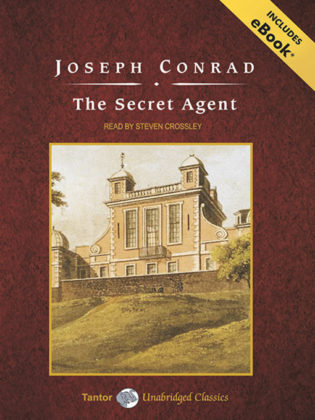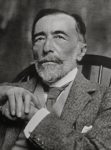 The Secret Agent by Joseph Conrad
The Secret Agent by Joseph Conrad Narrator: Steven Crossley
Published by Tantor Audio on May 10, 2014 (first published 1907)
Source: Library
Genres: Classic
Length: 10 hrs 21 mins
Format: Audiobook
Purchase at Bookshop.org or Purchase at Amazon
Add on Goodreads

Secret agent Mr. Adolph Verloc operates from a seedy Soho shop, where he deals in pornography and espionage. Idle, treacherous, and self-righteous, he makes the life of his wife, Winnie, one of silent misery. When Verloc is assigned to plant a bomb at Greenwich Observatory, his plans go terribly awry, and his family has to deal with the tragic repercussions of his actions.
Joseph Conrad's dark satire on English society, while rooted in the Edwardian period, remains strikingly contemporary. Presenting a corrupt London underworld of terrorists, grotesques, and fanatics, Conrad's savagely ironic voice is concerned not just with politics but with the desperate fates of ordinary people.
I have not read anything by Joseph Conrad before. Obviously, I’ve heard of him, but neither Heart of Darkness or Lord Jim ever made it to my TBR list. Honestly, I was looking for a classic audiobook available to “read now” from my library and came across The Secret Agent— the title grabbed my attention and the blurb made me borrow it.
Verloc is our secret agent in London who works for Russia? Germany?—it’s not really clear. Mostly he collects a check to pass on whatever rumors come his way and hangs out with anarchists. He also keeps on the cops’ good side by sharing info with them. His wife Winnie marries for security for herself and her brother, but has no idea about the true nature of his work.
Then, the rather nasty Mr. Vladimir, from “the embassy” tells Verloc that he needs to do more than observe to keep getting his check. He needs to do something, specifically blow up the Greenwich Observatory. Vladimir concludes that the attack will stir England into decisive, even extreme, action against criminal/revolutionary/terrorist elements or organizations—or something to that effect.
Verloc is far from thrilled with the idea, but feels that taking the action is his only real choice. But his plan blows up and the consequences are disastrous.
The terrorists are not crazy, they’re not evil, but they’re also not noble. They profess to be acting for ideals, but for the most part their motivations deal more with security and their egos. Honestly, I’m not sure I liked any of the characters. I could sympathize with them, but none of them were nice people, not even the cops.
It’s a tough book. Conrad repeats a lot of the same things over and over, which gives a rather uncomfortable feeling that fits well with the plot. The structure is not linear. We jump backward and forward in time at a couple of points, but for
The book was written in 1907 but takes place in 1886.

I had not heard of the Greenwich bombing.
Me either, but history is not usually my strong point.
It sounds like really tough bookto read…or even listen to…but you did it!
It was, but I never really got attached to any of the characters which made their fates a little less heart-wrenching.
That’s better!
I studied Heart of Darkness when I was doing A levels but it obviously made no lasting impression at all. I can’t for the life of me remember what it was about!
I think it’s about a trip up the Congo. I think the title has always scared me off to some degree; it does not sound like a fun book.